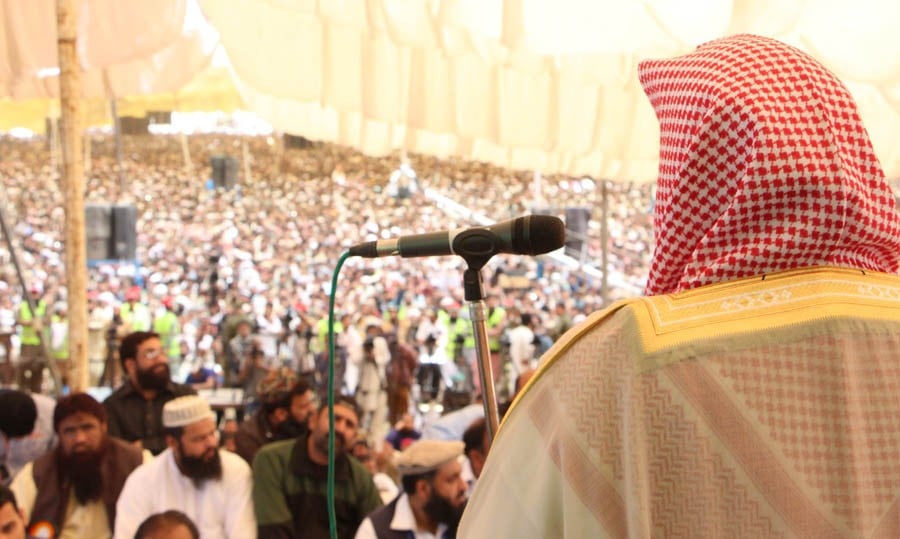
A recent conference in Kala Shah Kaku, held after the merger of an Ahle Hadith faction with Markazi Jamiat Ahle Hadith, was significant on many counts

After a gap of about 10 years, Markazi Jamiat Ahle Hadith (MJAH), a key Salafist religio-political party of the country, organised the two-day-long All Pakistan Ahle Hadith Conference in Kala Shah Kaku, a small town in Sheikhupura District about 19 kilometres from Lahore, on March 8 and 9, 2018.
Imam of Ka’aba, Dr Saleh bin Muhammad Al-Talib, especially arrived in Lahore to attend the conference on the religious group’s invitation. The five sessions of the conference organised in a makeshift tent city, were attended by tens of thousands of people who had come from across the country and abroad. The speeches were telecast live on the group’s online tv channel.
For analysts who study religious groups, MJAH’s conference was significant in the current political and security chaos in the country. MJAH is exploiting the vacuum caused by the recent ban on Jamaat-ud Dawah (JuD), another key Ahle Hadith group, and has strengthened after its recent merger with Jamiat Ahle Hadith Pakistan (JAHP) led by Allama Ibtisam Elahi.
In Pakistan, there are several Ahle Hadith groups, and MJAH is one of the key organisations with its roots traced back to the All-India Al-Hadith Conference held in December 1906 in Arrah region of Bihar, India. Professor Sajid Mir-led JAHP also manages the Wafaq ul Madaris al-Salafia, a board of Ahle Hadith seminaries across the country.
After Pakistan’s creation in 1947, Punjab especially its urban centres, such as Lahore, Faisalabad and Gujranwala, became the centre of the group’s activities. During the 1980s, Allama Ehsan Elahi Zaheer, a prominent religious leader, played a key role in activating the group across the country. The group during that time had opposed the Shariat Bill Movement and decided upon a separate role of the Ahle Hadith sect.
However, after the killing of Allama Ehsan Zaheer, who was injured in a bomb blast and later died of injuries during the meeting of Jamiat-e-Ahle Hadith in March 1987, allegedly by a Shia militia, a struggle for leadership ensued between Mir and sons of Zaheer. Mir’s support to the government was one reason behind the split.
But in recent weeks, Sajid Mir managed to woo Ibtisam Elahi, son of Ehsan Elahi Zaheer, to merge his group into the JAHP after 13 long years. Leaders of both groups, who had announced the split in 2004, on the occasion of their merger, vowed to unite the Alhe Hadith vote bank in the country.
Religious parties manage to garner votes on the basis of sect or school of thought. But Ahle Hadith groups in the political arena are comparatively weak in getting votes on sectarian lines. "For Ahle Hadith groups, forgetting the differences and coming together for unity is a good omen," says Qari Habibur Rehman, a teacher at an Ahle Hadith seminary in Karachi, who attended the Ahle Hadith conference in Kala Shah Kaku.
He says it would have a positive impact given the country’s politics and security landscape.
But JAHP does not enjoy good relations with the Jamaat-ud Dawah, another key Ahle Hadith group. Muhammad Amir Rana, director of Pak Institute for Peace Studies, says JAHP does not consider JuD follows the mainstream Salafi tradition. "Both had disagreement on authority of the fatwas on jihad. On the political front, they also remain divided. JAHP always prefers mainstream politics and JuD is considered close to the military establishment."
According to Mariam Abou Zahab, late French expert on militancy, the biggest contention between JAHP and JuD lies in their different doctrinal outlooks towards jihad. "The MJAH considers jihad to be a ‘fardh kifaya’ (non-compulsory obligation) while the JuD considers it to be ‘fardh-e-ain’ (compulsory obligation)," she wrote in one of her papers, titled Salafism in Pakistan: The Ahle-Hadith Movement.
JAHP is also very close to the ruling Pakistan Muslim League-Nawaz (PML-N) and because of the close working relations, PML-N leaders have appointed Mir and Hafiz Abdul Karim senators from Punjab. On March 15, Karim took oath as a federal minister.
A section of analysts believe the PML-N has been using JAHP in some of its constituencies of Punjab to garner Ahle Hadith votes. According to a JAHP leader, PML-N will field Hafiz Osama Abdul Karim, son of JAHP’s central secretary general Karim, from Dera Ghazi Khan to attract the religiously-motivated voters of the constituency.
The most important task given to JAHP is to counter the growing influence of JuD that has been using its political front, Milli Muslim League (MML), to spoil the ruling party’s vote bank. In the recent by-polls in Punjab, especially the heated by-polls of NA-120 Lahore, MML had bagged significant number of votes.
Also, after the merger of Ahle Hadith groups, differences over the leadership of the Muttahdia Majlis-e-Amal (MMA), an electoral alliance of six religious parties, representing different schools of thought or sects, have also surfaced. "Now the JAHP demands important positions in the alliance and more share of seats," says a leader of the Jamaat-e- Islami, a component party of MMA.